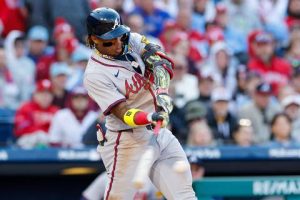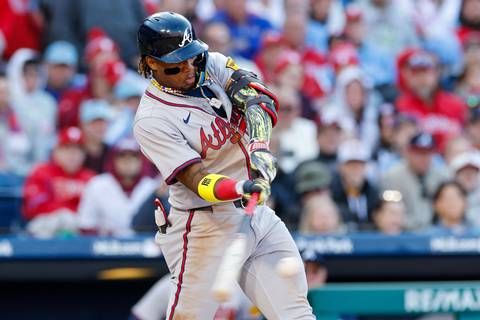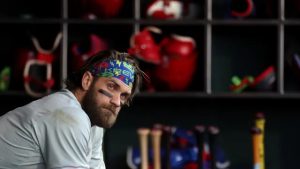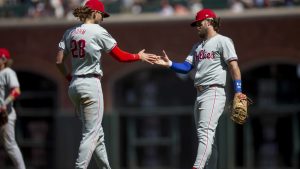
This piece was supposed to discuss Bryce Harper’s exceptional qualities, the quality that sets him apart from the several people we attribute it to, and how that quality has shown up in the group of players who surround him. However, since these are the Phillies of 2024, before I could finish writing, something else went their way. Go here to read more.
Noncontact knee injuries are among the top three sports-related terror words. It happened to Ronald Acuña Jr. on Sunday afternoon. After breaking for third base on a stolen-base attempt, the Braves star attempted to apply the brakes. He slumped to the dirt when his left leg failed him. The initial official statement only mentioned that he was taken out of the game because of knee pain. However, as the play’s video below shows, it didn’t look well.
As predicted, an MRI on Sunday night showed that he had torn his left anterior cruciate ligament completely, necessitating season-ending surgery. The Braves, without their undeniable leader and NL MVP in Spencer Strider, will now try to chase down the Phillies less than two months after Strider’s elbow injury.
Reaction is a natural reaction anytime anything similar occurs. It’s not always the callous thing that a lot of scolds warn it to be. It is entirely possible for a person to be able to feel the following three emotions at the same time: 1) pity for a fantastic player on a rival team who gets hurt; 2) disappointment that said team won’t be able to play at maximum capacity; and 3) wonder what it means for one’s own team.
In Acuña’s case, it is impossible to escape all three thoughts. He is without a doubt one of the select few players that can carry an entire game on their own and make it entertaining to watch. Acuña, the defending MVP who hit 41 home runs, 73 steals, and had an OPS of 1.012 last year, plays with a swagger and flair that is both addictive and (intoxicatingly) frustrating to watch. He so had a crucial role in shaping the Phillies into what they are today. An enemy is necessary for any excellent story in order to engage the reader or viewer in the conflict being fought.
Without Acuña, the Phillies could not have achieved their current level of success. Not in a comprehensive way. Yes, they would have achieved something. It’s a feat to make it to the World Series and then another NLCS. But would it have meant as much if they hadn’t defeated the formidable Braves led by Acuña?
So, yes, it is a story. But it is last year’s story.
And the year before that. This year? The story is different. The Phillies have positioned themselves to write it all their own. The Braves are no longer a fixation, no longer a behemoth susceptible only to acts of God. They are one of a number of teams that have spent the last two months watching the Phillies establish themselves as the class of the National League.
I hope I’m articulating my thought clearly enough. I’m not diminishing anything about Acuña, or his worthiness, and I’m certainly not downplaying the significance of any injury. I’m simply pointing out the transition the Phillies have made over this last month or so. As good as Acuña is, as much as he means to the Braves, his presence or absence is irrelevant to the Phillies right now.
That is how it feels when you spend the first two months of the season playing at a 114-win pace and build a seven-game lead in the division. When something happens behind you, it happens out of sight, because you are looking forward. Back to Harper.
He is the reason the Phillies enjoy their present sight lines. He is why they are where they are. You saw it on Saturday night in Colorado: two outs, top of the ninth, runners in scoring position, Phillies having just taken a 4-3 lead. He’d been ejected the night before, over a trifling matter, an incident that did not do any favors for umpire image consultants. He did what we have come to expect him to do: hit a home run that seals a game.
Expectations are the true measure of greatness. When Tom Brady stepped onto the field with a chance at a game-winning drive, you expected a certain outcome. When Michael Jordan had the ball in his hands on the elbow in a postseason game, you expected a certain outcome. Players like that are exceedingly rare, separate from many of those who may stake a legitimate claim to being great. They are the 1% of the 1%. Harper is one of them.
He is on pace for one of his greatest seasons: 39 home runs, 125 RBIs, 97 runs. He entered Sunday with a .942 OPS. Give him strong consideration for a third career MVP. What really matters is the manner in which he does these things. At 16 years old, he made people believe that greatness was preordained. The same is true at 31. Rarely has a player delivered as consistently and crucially as Harper has done since he signed with the Phillies. You don’t need to spend much time around him to understand it. He exudes the confidence that comes when talent mixes with singular focus.
The rest of these Phillies are a talented, likable lot, the source of much of their visible personality. But they are able to be that way because of the guy at their center. The gravity he imparts on a clubhouse is more than enough for all.
It’s funny. Ever since Harper arrived in Philadelphia, he has acted and spoken as if the Phillies were destined to end up where they currently are. Never mind that they’d spent their entire modern history chasing the Braves, that their few blips of excellence were swamped by a century of mediocrity. He is one of the rare ones who speaks and acts things into existence. He is the lead dog’s lead dog. Everything else is secondary.



